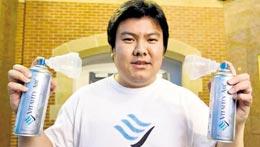Canadian firm to sell canned air in India

Just how much is a breath of fresh air worth? For people in New Delhi, ranked number one on a WHO list of cities with the foulest air, it may seem priceless.
But a Canadian company thinks the price is about Rs 12.50 (25 cents) per breath.
The start-up Vitality Air, based in Edmonton in the western province of Alberta, plans to start selling canned natural air from the Canadian Rockies to Indian consumers this May. The company made plenty of headlines in Canada in 2015 after it launched its product in China, where smog levels in Beijing and other big cities make for a close parallel to Delhi.
Vitality Air’s founder Moses Lam said: “It started as a novelty back in the summer of last year. There were forest fires in Calgary and with all the smoke, people started using our product.”
The former mortgage banker wanted to “do something disruptive” and the obvious model was the ubiquitous bottled mineral water.
Meanwhile, people from China started purchasing the canisters online and many suggested that what worked for smoke could apply to smog. Lam found a distributor in China and now covers seven cities, including Beijing and Shanghai, and has shipped nearly 12,000 pieces to that country.
The product consists of compressed air, breathed in through a mask, and comes in two flavours — Banff and Lake Louise. Banff in Alberta is a national park and a popular resort. “It’s close to Edmonton to start with, and it’s actually a natural treasure of Canada, it portrays fresh air,” Lam said.
That air is made available in 3-litre and 8-litre cans, with twin-packs costing between Rs 1,450 and Rs 2,800.
How they collect the air is a “trade secret” but it’s a “giant vacuum” process. “We suck up all the air in Banff, about 150,000 litres every time and it takes about 40 hours,” Lam said.
He’s confident Indians may be in the market for clean, crisp Canadian air. “The pollution in India is more than in China, we expect it to be our largest market.”
Taking charge of India operations is Vancouver-based Justin Dhaliwal, who said 100 bottles have arrived there and they’ll be test-marketing it soon, beginning with sending samples to the Canadian high commission in New Delhi and setting up kiosks in malls while raising social media visibility.
Lam said their experience in China showed that users included pregnant mothers, corporate executives, and even students preparing for examinations. Now, they’re waiting with bated breath to see if the concept takes off in India.
– HT









